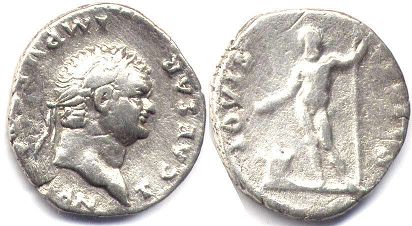Coins of Titus - catalog with values
Roman Emperor (79-81)

T CAESAR IMP VESPASIANVS
IOVIS CVSTOS
denarius 79
silver
Rome
18 mm.
Bust right in a wreath / Titus Caesar Emperor Vespasianus
Jupiter left, sacrifices on the altar and holding scepter / Jupiter Keeper
Coin value ~ US$60-80
Costs of Titus coins in this catalog approximate and indicated specifically for the coin shown in the picture.
I do not buy or sell coins - this is just a catalog.
See other coins of Imperial Rome.

